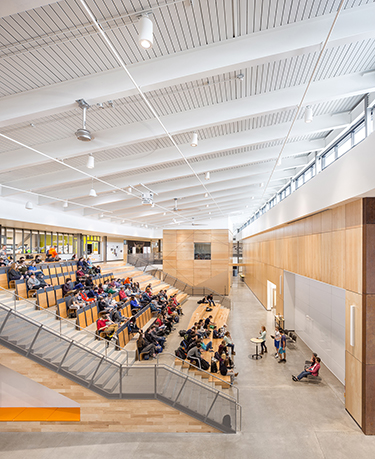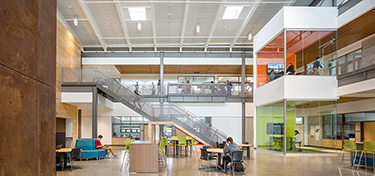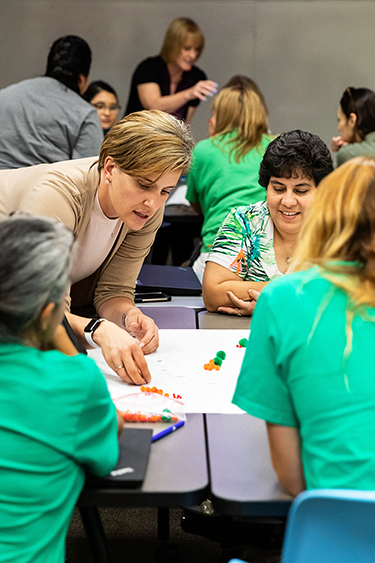|
Subscribe / Renew |
|
|
Contact Us |
|
| ► Subscribe to our Free Weekly Newsletter | |
| home | Welcome, sign in or click here to subscribe. | login |
Construction
| |
 |
August 27, 2020
How the pandemic can change education for the better
DLR Group

Froese
|
Earlier this year, the immediate shift to remote emergency learning as a result of COVID-19 forced school districts to think differently about the delivery of education. In many cases, a culture of lecture-based instruction fell flat as it was pushed online.
To find out more about how the pandemic is changing learning among K-12 communities, DLR Group conducted personal surveys with school districts across the country, representing more than 2.6 million learners. The data collected supports what we are now seeing going into the fall semester — to one degree or another, virtual learning is here to stay.
The pivot in instructional delivery with this pandemic has shifted the mindset exponentially out of absolute necessity. The re-creation of authentic learning experiences is both a hurdle and an opportunity and has paved the way for an inquiry-based learning model for student engagement and authentic learning.
Transferring responsibility
Inquiry-based education offers a methodology that does not rely solely on the educator being the lead in all learning. It is an active form of learning that begins with inquiry, problems and scenarios. Learners identify, investigate and research issues and respond to challenges or complex problems. In addition, this mode of learning can support a broader variety of learning styles, allowing students to select their modes of discovery; and for those learning virtually, maximize tools available in their own homes.
By moving through the three levels of inquiry — structured, guided and personalized — learners acquire the skills for personalized and individualized learning and are prepared for future success:
• Structured: In a structured environment, the learner follows the lead of the educator and the entire class engages in one structured lesson together.
• Guided: In a guided approach, the educator chooses the topic and essential question, while the learner has autonomy to design the product or solution.
• Personalized: In this case, the learner creates her own essential question with support from the educator, researches needed resources, orchestrates her learning evidence, and designs how she will demonstrate her learning.
Inquiry-based learning
The educator facilitates the development of an essential question focused on the inquiry-based question based on the state standards and determines the formative assessment to ensure those criteria are being met. A typical inquiry-based cycle starts with an essential question, that can diverge or follow a single area of study such as math or English.
Students find real-life experiences from different mediums to then complete their assignment (e.g. reading an article, conducting an interview, listening to a podcast, watching a video). Working from home, they can work at their own pace with regular check-ins with their teacher. Additionally, the instructor can offer before and after school “office hours” to provide parents and caregivers the opportunity to ask questions and monitor their student’s progress.
The final stage of the inquiry-based learning cycle is reporting out, reflection and carrying the lessons forward. By designing the lessons to be attainable for all, this approach maximizes personal interests of the student, and uses resources they have available at home.
Adapting the learning environment
This mode of learning offers varied levels of autonomy and independence and can be implemented anywhere — from brick-and-mortar settings to remote locations. Rather than imposing a strict linear progression through phases, inquiry-based learning supports learners as they weave through the facets of exploration.
The actual environment where inquiry-based learning occurs is a key element in the success of the learner and must be one that motivates, inspires and challenges individuals to achieve excellence. This environment can be divided in to four respective parts, including academic, physical, social and emotional, and community:
• Academic. Establishes high expectations and prepares learners for their future.
• Physical. Encourages engagement through flexible spaces, adaptable furniture and current technology.
• Social and emotional. Provides a foundation for safe and positive learning, and the development of positive relationships.
• Community. Affords the opportunity to interact with other individuals who share common interests throughout the school, the surrounding community and across the world.
Catalyst for change
While many people believe this pandemic to be a negative experience for academia, our survey data and ongoing conversations with our clients tell us otherwise. COVID-19 can be the catalyst to change an entire K-12 education system through a transformational shift in the delivery of education. Never have we had the opportunity or reason to push teaching and learning to the degree it has already been impacted.
School districts should be bold in their educational thinking post-pandemic. Inquiry-based learning may be a relatively new concept to many communities across the country, which is why school districts that opt to make the transition to inquiry-based learning in 2020 and beyond must invest in professional development to provide educators with the tools to authentically teach in a hybrid environment. Without a clear change process, teaching and learning behaviors may slip back to a pre-COVID-19 mindset.
Looking backwards at where we’ve been, not where we are heading, will never do justice for our young learners and future leaders. We must take this opportunity to change and adapt for the better.
Emily Froese is an educational planner who helps school districts and communities holistically respond to changes in the world that impact the overall experience for every learner.
Other Stories:
- Building schools is about building communities
- Learning inside and outside the box
- First U.S. net zero school has 10-year checkup
- Eastside school’s HVAC system zaps the bad stuff
- Idaho school master plan takes on Living Building Challenge
- Community engagement drives design for Tacoma school
- Modular classrooms are a quick study in filling vital needs
- Modified mechanical systems for healthier schools
- Students get a boost from outdoor connections
- UWT project focuses on equity, justice and design





